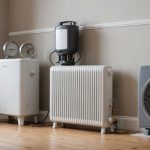Understanding the Impact of Heating System Upgrades on Property Insurance
Heating system upgrades can significantly influence property insurance. Insurers often evaluate heating systems while determining coverage and premiums. A system’s age, efficiency, and type are key factors. Insurers tend to favour upgrades as they typically reduce risks associated with old or inefficient systems.
Homeowners might wonder why insurers find these upgrades beneficial. Primarily, newer systems adhere to modern safety and efficiency standards, lowering the potential for fires or malfunctions. Such improvements can thus lead to reduced claims for insurers, who then pass those savings onto policyholders through lower premiums.
In the same genre : Comprehensive legal framework for successfully evicting tenants from uk commercial properties
A common misconception is that any heating system change automatically leads to reduced insurance costs. However, insurers assess the specific type of upgrade and its compatibility with safety norms. Thus, while upgrades often lead to insurance benefits, not all modifications guarantee lower premiums without the assurance of compliance and enhanced safety.
By understanding the nuances of insurance and heating system assessments, homeowners can make informed decisions. Engaging with insurers before conducting upgrades ensures alignment on risk reduction and potential premium adjustments, ultimately benefiting the homeowner economically and offering peace of mind.
Have you seen this : Transforming your home: a complete guide to the crucial legal documents for converting residential property to commercial use
Benefits of Upgrading Your Heating System
Upgrading your heating system can bring about substantial benefits, most notably in terms of energy efficiency. An efficient system uses less energy to produce the same level of warmth, which can significantly reduce household energy bills over time. This improved efficiency not only reduces costs but also contributes to environmentally friendly living by lowering carbon footprints, aligning with broader sustainability goals.
Moreover, insurers often recognise and reward such improvements with potential insurance discounts. By enhancing your system’s efficiency, you may qualify for lower premiums as insurance companies tend to view newer, efficient systems as less risky. The reduced likelihood of hazards such as fires or malfunctions translates to a decreased risk for insurance claims, incentivising insurers to offer attractive terms to policyholders who invest in upgrades.
Consider the real-life scenario of a homeowner who replaced an old boiler with a state-of-the-art heat pump. This upgrade led to a direct reduction in yearly energy expenses, coupled with a noticeable decrease in insurance premiums. These financial benefits underscore the comprehensive value of committing to energy-efficient heating system benefits, allowing homeowners to enjoy both immediate and long-term economic advantages.
Types of Heating Systems and Their Insurance Implications
Understanding various types of heating systems and their implications on insurance is crucial for homeowners. Insurers assess different systems, such as central heating, boilers, and heat pumps, based on their compliance with modern safety and efficiency standards. Each type has distinct features that influence insurance considerations.
-
Central Heating Systems: Often viewed favourably by insurers due to their ability to distribute heat evenly, ensuring safety and efficiency compliance.
-
Boilers: Consider insurance implications carefully; newer models are generally safer and more efficient, thus potentially lowering premiums.
-
Heat Pumps: Increasingly popular for their energy efficiency, these systems align with insurers’ safety norms, often resulting in insurance discounts.
Adhering to compliance standards is pivotal. Systems meeting current safety benchmarks mitigate risks, such as fires, and are perceived as lower liability by insurers. This perception can translate into economic benefits for policyholders through reduced premiums.
Optimising insurance benefits relies on selecting a system that insurers deem low-risk while ensuring it passes all necessary safety and efficiency criteria. Homeowners are advised to consult their insurers during the selection process to maximise potential insurance benefits.
Case Studies on Upgrades and Insurance Premium Changes
Exploring case studies offers tangible insights into how heating system upgrades impact insurance premiums. A homeowner in rural England cited an impressive transformation: upgrading from a 15-year-old boiler to a modern air-source heat pump led to a 25% reduction in annual insurance costs. This real-life example highlights the insurance benefits of embracing newer, efficient systems.
Insurance professionals emphasise that comparative analysis is essential before upgrading. Two homes, each upgrading heating systems, may experience varied premium adjustments based on the initial system and regional factors. While one might observe dramatic decreases in premiums, another with a similar upgrade might see minimal change.
Further testimonials reveal that insurers factor in pre-existing conditions, geographic risks, and individual household needs alongside the system upgrade. Therefore, case variances are common. Experts recommend homeowners conduct thorough research and engage insurance providers for detailed feedback specific to their situation.
For homeowners, understanding these case studies can inform decisions on heating systems and insurance management. Collaborating with insurance professionals can provide comprehensive insights into predicting potential premium changes, equipping homeowners with the knowledge to make informed upgrade decisions.
Risk Assessment Factors Related to Heating Systems
When considering heating system risks, insurers evaluate several key aspects to determine appropriate insurance coverage. A primary factor is the system’s age, as older systems may present increased risks of malfunctions or inefficiencies, leading to potential fire hazards or costly repairs. By assessing the age, insurers can ascertain the likelihood of incidents and adjust premiums accordingly.
Another crucial element is the heating system’s compliance with modern safety standards. Systems adhering to the latest norms are viewed as less prone to accidents, thus lowering risk profiles. Insurers favour systems that integrate safety features, such as automatic shut-off mechanisms or advanced thermostatic controls, as they significantly mitigate issues like overheating or leaks.
Regular maintenance also plays a pivotal role. Consistent upkeep ensures the system functions optimally, reducing risks of failures and therefore preserving any insurance benefits acquired through lower premiums. Insurers may require evidence of regular servicing as part of their risk assessment process, encouraging homeowners to keep maintenance records up-to-date.
By understanding these risk assessment factors, homeowners can ensure their upgrades maximise insurance benefits and maintain coverage stability. Engaging with insurance providers about these factors before upgrading aids in achieving both safe home environments and favourable insurance terms.
Practical Tips for Homeowners Considering Heating System Upgrades
Before undertaking heating system upgrades, it is crucial for homeowners to take strategic steps to maximise benefits. Begin by conducting a thorough evaluation of your current system’s efficiency and safety. Outdated systems may not only escalate energy costs but also impact insurance premiums negatively.
Consulting with your insurance provider is paramount in understanding how specific upgrades affect your property insurance. Insurers can offer insights on which upgrades qualify for premium reductions and ensure that your chosen system aligns with compliance standards.
In terms of recommended upgrades, focus on systems known for energy efficiency and modern safety features. Heat pumps and newer central heating systems often provide the most favourable insurance terms due to their adherence to safety regulations and ability to lower risk.
- Research: Investigate different types of heating systems and assess which meets your needs and satisfies insurers.
- Consider longevity: Opt for systems with a proven track record of reliability and low maintenance costs.
By proactively approaching the upgrade process and engaging with insurers, homeowners can achieve improved energy efficiency, potential insurance discounts, and enhanced property safety. Stay informed about industry developments to make the most educated decisions regarding heating system upgrades.
Expert Opinions and Insights
Gaining insights from industry experts can significantly influence your understanding of heating systems and how they intersect with insurance industry trends. Experts highlight that ongoing advancements in heating technologies, such as smart thermostats and eco-friendly systems, are reshaping insurance assessments. These upgrades are often seen favourably due to their capacity to align with modern safety standards, leading to enhanced insurance coverage options.
One notable trend observed by professionals is the shift towards integrated home systems. These technologies not only boost energy efficiency but also integrate seamlessly with insurance-approved safety measures. Experts suggest that homeowners consider heating systems that allow for easy upgrades, as insurance policies are increasingly looking for systems with adaptable features.
Interviews with insurance professionals reveal a growing emphasis on customised policies. With diverse heating systems available, insurers are crafting personalised contracts that align closely with specific homeowner needs and risks. This approach ensures that policies accurately reflect the usage, efficiency, and safety of modern heating systems.
For homeowners, staying abreast of these emerging trends and expert recommendations can be instrumental. Engaging with knowledgeable professionals can offer invaluable guidance in choosing systems that optimise both energy efficiency and insurance benefits.
Conclusion: Navigating Upgrades and Insurance
Embarking on the journey of heating system upgrades not only enhances comfort but can have profound implications on your property insurance. As explored throughout this article, choosing the right system improves energy efficiency and safety, which tends to be viewed positively by insurers. Understanding these impacts is essential for informed decision-making.
Before committing to an upgrade, ensure you converse with your insurance provider. This dialogue clarifies what premium adjustments you may expect for specific upgrades, ensuring your choices align with insurance benefits as well as energy savings. This proactive approach helps protect your investment while maximising financial returns.
Maintenance remains pivotal in sustaining the benefits of these upgrades. Regular checks and adherence to manufacturer guidelines preserve the system’s efficiency and safety, keeping your insurance premiums optimised.
As you navigate the evolving landscape of heating technologies, stay informed about industry developments and emerging trends. This knowledge arms you with the insights needed to choose systems that not only provide long-term benefits but also harmonise with insurance requirements, safeguarding both your finances and home. Engaging in strategic upgrades, coupled with ongoing consultation with insurers, ensures a well-informed, secure property insurance journey.









